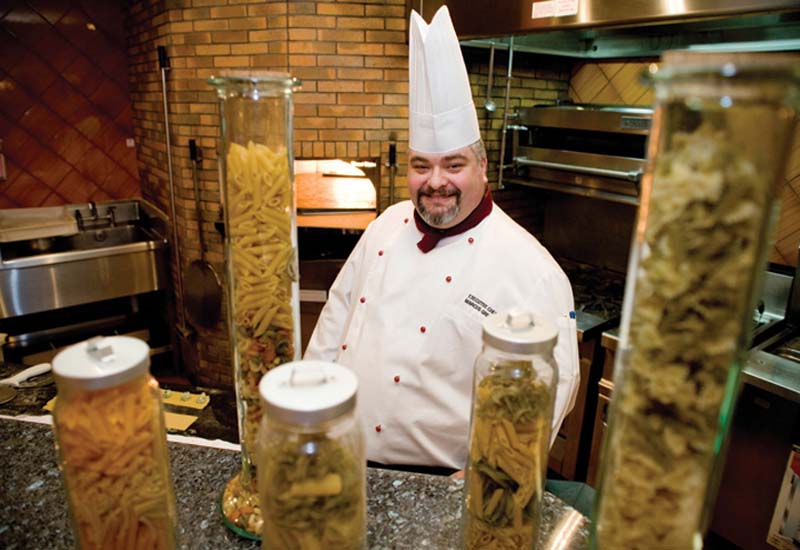McGowan: In Saudi we have the support of solid importers from around the region. However, the importation by-laws can create additional expenses for them sometimes in terms of labelling, customs and so on.
Products we are unable to purchase include alcohol and pork-based items.
Knaubert: Sourcing supplies is a challenge in any region. You will always find a problematic item among your products.
On one hand, it is our responsibility to adjust ourselves to the market. On the other, I see myself as a teacher, helping local producers to get their product right for the operation's needs.
Generally speaking, high-end products and luxury goods can be difficult to find. Unfortunately, the variety of organic products is very limited in the region as well.
How do you ensure that your restaurant operations continue to generate maximum revenue and remain profitable?
Wardhana: We minimise wastage and try to deliver quality at a reasonable price to attract more people, as more guests equals more revenue.

Advertisement
Gube: I believe in being on the floor, front-of-house, and observing the quality and the type of products guests require - this is what I call selling well.
We keep the classic and frequently requested dishes on the menu and modify the ones that are not selling very well, and we always try to be attractive in terms of quality and price.
We also maintain our selling prices in accordance with the market.
McGowan: Daily briefings and weekly one-to-one meetings with the department heads allow brainstorming and interaction from the chefs and restaurant managers. Also, studying guest comment cards provides us with ample suggestions that allow us to anticipate the needs of our guests.
Knaubert: Decisions we make in the kitchen need to make sense. I cannot afford to put items on our menus that only I believe in. A menu must be attractive to customers rather than being solely a reflection of the executive chef's ego.
We always need to have our signatures on the menu, but we must also accept the guests' tastes and cater to them. This is the key to customer satisfaction.
Satisfied customers will come again and bring new customers to our locations.
How much of your time is spent looking after the business aspects of your restaurants?
Gregs: Currently it is an 80:20 split between business and being hands-on in the kitchen.
Wardhana: For me it's 70:30, business versus cooking.
Sebastien: Most of my time is spent on business aspects rather than in the operation itself. I would say it's a 70:30 split.
McGowan: With the importance of clear and concise communication relayed to the team, 35% of my day is in a meeting environment, which enables me to be hands-on for the remaining 65%.
Knaubert: I would say that it is a 50:50 split for me, on average.
There are times where I need to be more of a businessman while at others I need to focus more on the traditional chef's role. I like both sides of the job and they are equally important.
Would you prefer the balance between time in the kitchen and time in the office to be different?
Gregs: I would prefer an 85:15 cooking to business ratio.
I have spent a long time training to cook, but the higher you get in your career, the less actual cooking you do. I would rather have someone else to do the paperwork and let me do what it is that I love doing.
Wardhana: I still really enjoying cooking and prefer it to sitting in front of the computer doing budgets, but that's not to say that side of things is not important. Unfortunately, this is what we have to do now.
Sebastien: I definitely wish I could spend more time cooking.
The fundamental of our job is to cook, come up with new recipes and please the guests. We haven't been trained to stay in an office.
Gube: The volume of administration work is increasing year-on-year but I would like to be able to spend more time with my chefs in the operation to continuously train them in technical skills.
As it is, I have to share this role with the exec sous chef due to my time constraints.
Knaubert: The balance between the kitchen and the office is the key to job satisfaction.
I do like to understand and control the business part of the job and I get satisfaction from our good numbers, but I wouldn't be a good executive chef if I failed to guide my team through the hands-on work in the kitchen.
I do love to work with food. Menus are created on the cutting board and stove rather than in the office on the computer.
What improvements could be made at your property to help make your job easier?
Gregs: A secretary would make my life a lot easier and would allow me to cook more.
Gube: Giving more responsibility to the chefs and empowering them to treat their outlet and operation as if it was their own business, their own profit centre.
McGowan: The addition of an administrative assistant would allow me more time in the heart of the house, which in turn would enhance the morale and the product control.
Knaubert: I cannot wait for help from outside - we all need to step up and guide our team.
That is our real duty as exec chefs, and it is in our own hands to make our lives easier.









 Search our database of more than 2,700 industry companies
Search our database of more than 2,700 industry companies









